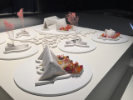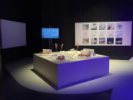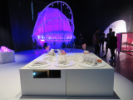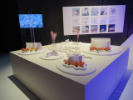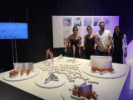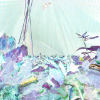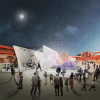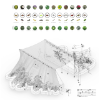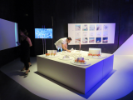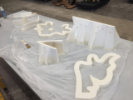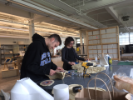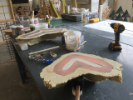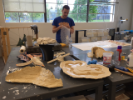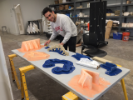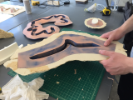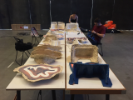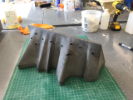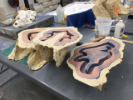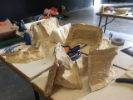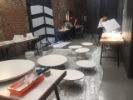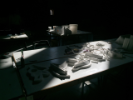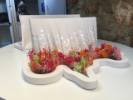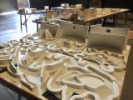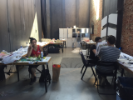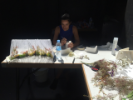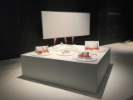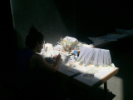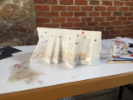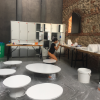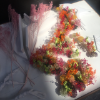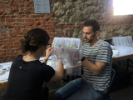"Renaturing" a former slaughterhouse to respond to a changing climate
Urban furnishings bring awareness to all species of urban dweller

MArch student Zach Fields makes last-minute final touches to Hwang's Hidden in Plain Sight concept models at the "Cyborg Garden, Mutant Institute of Environmental Narratives" exhibition in Matadero Madrid
Published July 18, 2019 This content is archived.
by Charles Wingfelder
As part of a multi-year initiative in Madrid, associate professor of architecture Joyce Hwang will join an international group of designers to explore how design can create a new discourse on climate change in the context of public space.

The project is part of a broader initiative, Matadero Mutant Action, which seeks to frame global planetary changes as a challenge that is as much cultural and political as scientific and technological. Directed by Matadero Madrid and curated by elii [architecture office], the project is part of a collective “Cyborg Garden,” a group of projects being developed to turn the outdoor spaces of the sprawling Matadero Madrid complex into a laboratory for testing nature-based solutions that will culminate in a series of replicable prototypes capable of raising the resilience of this public space in Madrid.
Hwang and her design team are developing concepts that make the vast open outdoor areas of the Matadero warehouse complex more habitable in the face of global climate change. Proposals will focus on shading and “renaturing” these public spaces to help the complex adapt to the extreme heat waves that plague Madrid with increasing frequency. elli [architecture office] will coordinate efforts to bring ideas together collaboratively for eventual installation at Matadero.
Learn more about Matadero and its transformation from slaughterhouse to a world-renowned cultural hub

Hwang invited former UB faculty Nerea Feliz, now on the architecture faculty at the University of Texas at Austin, to partner with her on this project. Working together under the name of Double Happiness, the two first traveled to Spain in February to tour the site, meet involved parties, and conduct a series of workshops that kicked off the design process. Over the course of five days, more than 100 students from 12 design schools in Madrid collaborated with the designers to begin generating ideas for a “mutant garden.”
Since then, Hwang and Feliz have worked with their project team in Buffalo and Austin to develop these ideas. Their concept, Hidden in Plain Sight, is a proposal for a series of urban furnishings that aim to amplify and bring awareness to various forms of urban “life” through visual, tactile and ecological means. The project is designed to support an inclusive web of interdependent species, both human and non-human.

Learn more about the Double Happiness concept, Hidden in Plain Sight
The teams regrouped with their proposals at Matadero Madrid in June to exhibit prototypes at various scales and in various media.
Hidden in Plain Sight is part of the Cyborg Garden, that together with the Eco-visionaries exhibition, is on view at Matadero Madrid from June 13 - Oct. 6, 2019. It is the first in a series of installations and developments over the course of several years and reveals how artists, architects, and designers grapple with complex facets of the environmental crises, including the extinction of species, deforestation, air pollution and the need to imagine new food systems.
The Cyborg Garden exhibition is part of the first activities carried out by the Instituto Mutante de Narratives Ambientales-IMNA (Mutant Institute of Environmental Narratives). The IMNA is developed by Matadero Madrid director Amanda Masha and elli [architecture office] as a framework using fictions to rethink the relationships between nature and culture. IMNA is supported by Plataform-A, an interdisciplinary network made up of the Technical University of Madrid (UPM) through its center itdUPM (Innovation and Technology for Human Development Centre), Madrid City Council, through its Environment and Mobility Division, and Matadero Madrid. The platform brings together an international group of artists, designers, researchers, thinkers, scientists, engineers, architects and many other agents around artistic research and production to tackle the climate crisis.

